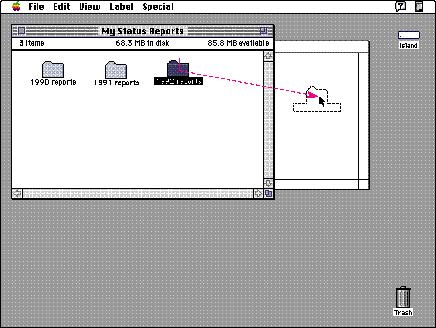Direct manipulation: Difference between revisions
Jump to navigation
Jump to search
No edit summary |
No edit summary |
||
| Line 1: | Line 1: | ||
{{Definition|'''Direct manipulation''' — proposed among others by [[Ben Shneiderman]] — allows a viewer to interact with a visulization corresponding to the real–world analogue it follows. It avoids the barrier of having to translate ideas into commands meaningful to a computer by building a ''graphical user interface'' that is ''semantically'' in line with the representation.}} | {{Definition|'''Direct manipulation''' — proposed among others by [[Ben Shneiderman]] — allows a viewer to interact with a visulization corresponding to the real–world analogue it follows. It avoids the barrier of having to translate ideas into commands meaningful to a computer by building a ''graphical user interface'' that is ''semantically'' in line with the representation.}} | ||
[[Image:directmanipulation.jpg]] | [[Image:directmanipulation.jpg|float]] | ||
{{FloatingQuote|Direct manipulation allows people to feel that they are directly controlling the objects represented by the computer. According to the principle of direct manipulation, an object on the screen remains visible while a user performs physical actions on the object. When the user performs operations on the object, the impact of those operations on the object is immediately visible.| Apple Computer, Inc.}} | {{FloatingQuote|Direct manipulation allows people to feel that they are directly controlling the objects represented by the computer. According to the principle of direct manipulation, an object on the screen remains visible while a user performs physical actions on the object. When the user performs operations on the object, the impact of those operations on the object is immediately visible.| Apple Computer, Inc.}} | ||
[[Category: Glossary]] | [[Category: Glossary]] | ||
Revision as of 01:28, 15 June 2005
Direct manipulation — proposed among others by Ben Shneiderman — allows a viewer to interact with a visulization corresponding to the real–world analogue it follows. It avoids the barrier of having to translate ideas into commands meaningful to a computer by building a graphical user interface that is semantically in line with the representation.
Direct manipulation allows people to feel that they are directly controlling the objects represented by the computer. According to the principle of direct manipulation, an object on the screen remains visible while a user performs physical actions on the object. When the user performs operations on the object, the impact of those operations on the object is immediately visible.
Apple Computer, Inc.
